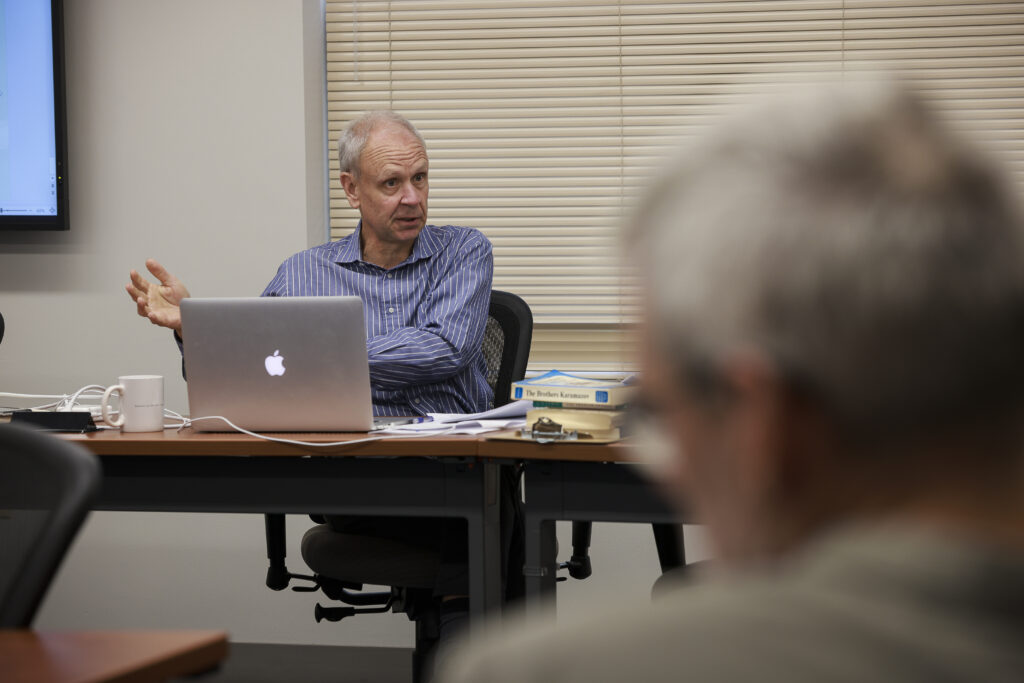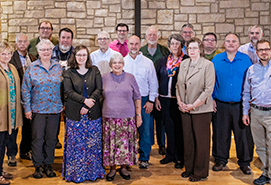He’s Not a Luddite, But …

Dr. Russell Haitch, professor of theology and human science, thinks we should all be paying closer attention to the transformational — and potentially calamitous — societal change that artificial intelligence (AI) will bring.
“Generative AI is not just one more technology,” says Haitch. “I join with those experts who think we are entering an unprecedented period. For the first time in history, machines are going to have agency. They will be capable of devising their own plans and carrying them out. Right now, humans are still in control. But we don’t know for how much longer.”
Most new technologies carry both potential benefits and pitfalls, and in this respect Haitch agrees AI is similar, though he claims the stakes are considerably higher.
“It seems reasonable to hope that AI can be used to tackle big problems, such as climate change or curing cancer,” he states. “For example, each year the world’s medical journals publish over a million peer-reviewed articles. Obviously no person could read them all, let alone analyze and synthesize all the data sets. But AI is already incredibly adept at this kind of work.”
Haitch predicts the pitfalls may take longer to see, and they may not be in the places people look first. “Because technology is so tied to money, people tend to focus first on the economic implications, such as the impact on jobs.”
While AI is bound to affect many lines of work—including, he stresses, the jobs of pastors and professors—as a theologian Haitch is most concerned with its overall influence on our relationships with one another and with God. To illustrate this point, he recalls the advent of automobiles and assembly-line production. “These technologies slashed employment opportunities for blacksmiths and farriers at the same time they gave rise to new manufacturing jobs,” he says. “But the larger widespread impact lay in the way that cars drove communities apart. Instead of walking together to church, people drove far and wide to different church or to the beach on Sundays.” He thinks AI promises, or threatens, to bring even more radical changes, “because people are going to be forming closely-bonded relationships with machines, not just through machines as in the case of the internet and social media.”
During a recent visit to the Susquehanna Valley Ministry Center as a guest lecturer, Haitch found that attitudes of audience members defied stereotypes of younger people being more comfortable with technology than older folks. Some older people welcomed the possibility of assistive technologies like driverless cars. “People expect innovation and seem ready to accept it,” says Haitch. “Experts in technology seem more worried than the general public about the potential dangers of a society that becomes reliant on — or even dominated by — intelligent machines.”
Haitch has often explored how faith relates to science and technology in his scholarly work. His book, The Eyes of the Heart: Seeing God in an Age of Science (Fortress, 2021) offers a model for unifying faith and science with sacrificing either Christian convictions or good science. He is currently working on a new book with the working title Godlike Power: AI and the Future of Faith (IVP Academic, forthcoming 2025).
Haitch reports AI enthusiasts often use the phrase “Godlike power” to describe AI. They hope to wield this power to human advantage. “But the people in charge of this Godlike power, almost all of them, do not believe in God. God is not real to them,” he points out. “I’m not making an eternal judgment but a here-and-now assessment based on their own words. And history tells us repeatedly how our creative powers, when separated from a relationship of harmony with God, can turn unbelievably destructive.”
One theme of Haitch’s current work is the need for “spiritual sobriety,” which the Eastern Orthodox tradition calls nepsis (?????) and which derives from New Testament instructions to be attentive, discerning, watchful, and sober-minded.
Haitch observes: “As ‘users’ of technology, we are well aware of its addictive properties. We have already seen how the so-called attention economy of the internet keeps people engaged by promoting polarization. These forces can get much worse with AI.” In response to this latest technological threat, he recommends ancient Christian practices: “Spiritual sobriety is sometimes called ‘bringing the mind into the heart.’ When cultivated through various forms of prayer and fasting, including fasting from technology, it can help to free us from a cultural addiction to technology and intoxication with power.”
Another focus of Haitch’s work is the ongoing longing for relationships of intimacy. He refers to the Jewish theologian Martin Buber (1887-1965) whose philosophy focused on the distinction between “I-Thou (or You)” relationships versus “I-It” relationships. “Buber was talking about two different ways of living and being in the world,” Haitch states. “I-It relationships are instrumental. “I-You” relationships tend toward intimacy. I-It relationships are about using and being used, whereas in relationships that tend toward intimacy we are knowing and being known, seeing and beheld, loving and being loved.”
As he sees it, the longing for “real presence and true intimacy” will persist in the age of AI—though technology in general and AI especially can work to promote a mechanical or instrumental approach to life—and he hopes churches will be communities where people can find this longing fulfilled.
“AI engineers are working tirelessly to make machines more human-like,” says Haitch. “It challenges believers to be more devoted to God’s project of making people more human, according to the pattern of humanity revealed in Jesus Christ.”
####
This article was originally published in the Spring/Summer 2024 issue of Wonder & Word.








 Green Circle: Bethany invests in 100% renewable energy.
Green Circle: Bethany invests in 100% renewable energy.